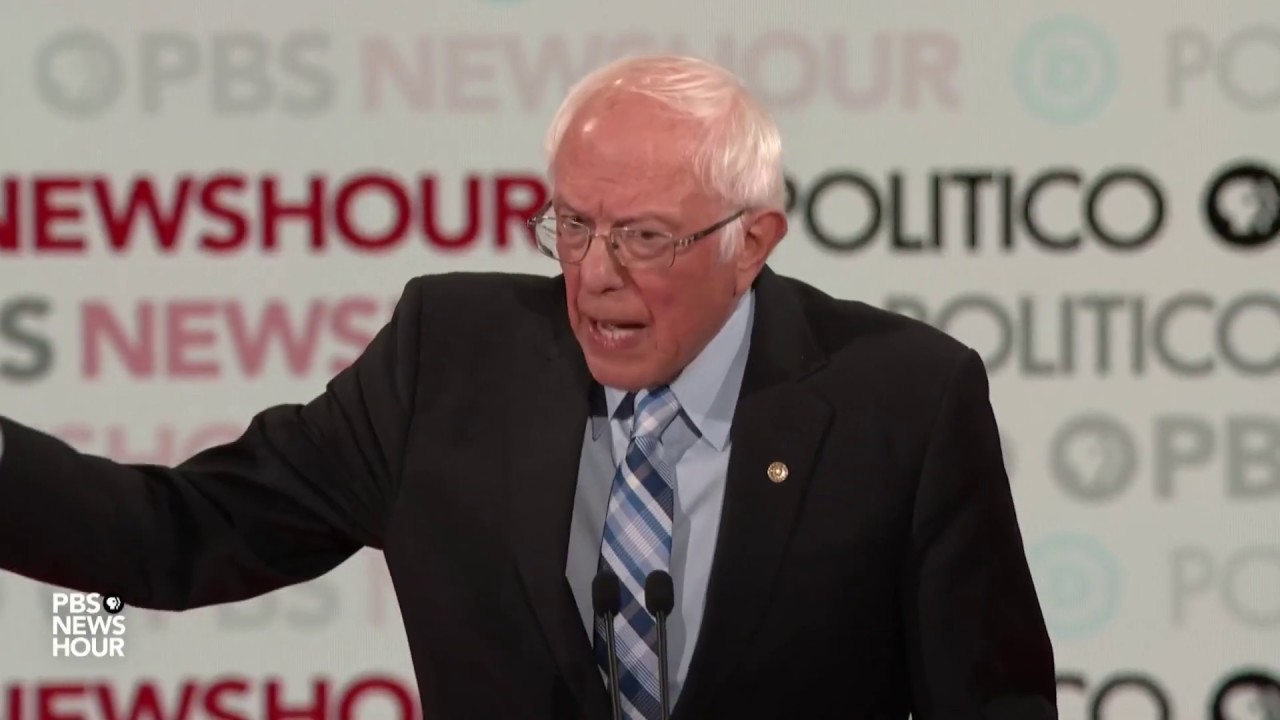
Prompt Images
Bernie’s “Awkward” Debate Moment on Race was an Ironic Paradox for the Climate Change Narrative
In Thursday’s Democratic debate, even the most ardent Bernie Sanders supporters cringed a bit when their candidate was asked a question on race and, instead of answering directly, pivoted to climate change. The sharp retort by Judy Woodruff to “put him back on track,” along with the audible reaction from the audience only exacerbated the situation.
Ironically, Bernie seemingly pivoted to climate change because he was not given a chance to speak about the topic while other candidates—like Andrew Yang, whose climate solutions read like a bad Issac Asimov novel—fielded questions. His passion for the subject matter was welcomed by climate justice practitioners and “environmentalists” who have observed the issue of climate all but ignored in previous debates. But punting on a race question is going to raise some serious eyebrows. However, that’s not actually what Bernie did, in fact, he did quite the opposite.
Let’s be clear, no one can debate that Senator Sanders has come a long way, from the Shire to Mordor and back, on racial justice. His 2016 environmental justice platform was the best of all the candidates who ran that year, and his 2020 climate change platform ranks among the best due to its focus on Black, brown, and indigenous frontline communities who disproportionately experience acute and chronic assaults on their public health, their cultures, and their lives by a climate crisis they had little hand in creating.
To this end, Sanders was absolutely correct to link the climate crisis to race and ethnicity.
The stats cannot be denied, and we have known since 1987 when the United Church of Christ released its landmark report, Toxic Waste and Race, that race plays a bigger role in perpetuating environmental injustice than class. Making this point more lucid In 1990, premier Environmental Justice scholar and practitioner, Dr. Robert Bullard explained in his opus, Dumping in Dixie, “African American households with incomes between $50,000 and $60,000 live in neighborhoods that are more polluted than neighborhoods in which white households with incomes below $10,000 live.”
But don’t tell this to the class reductionists, neo-Marxist eRACEists, born-again white “socialists,” and a certain magazine, that puts the “con” in Jacobin, who will typically accuse you of so-called “Identity Politics” faster than you can say, “Not Me—Us.”
It’s their Pavlovian reaction to any discussion about race and white supremacy, after all. However, something changed with much velocity after Bernie’s “awkward” moment during the last debate: His white supporters, and a few of his Black and Brown ones, dove headfirst into the opportunity to pontificate within the Twitter and Facebookverses that INDEED, the climate crisis is a racialized one. All it took was a white octogenarian from a majority-white state to shepherd his white supporters to a truth that frontline communities have been espousing long before Greta Thunberg, and even longer than nascent and vague concepts like “Green New Deal” dominated the lexicon.
It’s a Festivus MIRACLE and ‘tis the season.
So that’s the paradox., And, if I am putting aside my unapologetic Brooklyn/Uptown proclivity for mordancy, I am actually very thankful to Brother Bernie. He has also elucidated the massive tartuffery exhibited by many of his supporters and the “environmental” groups and community (not to be confused with the environmental justice/climate justice community) who support him.
Frontline communities have always understood and espoused the truth that climate justice is racial justice.
But the process of leading white-led environmental/”progressive” groups and individuals to this conclusion has remained a byzantine initiative, at best. But fate, it seems, is not without a sense of irony.
Because now that Brother Bernie linked climate and racial justice directly, on TV and in front of millions, perhaps the racial variables of the climate crisis will get more attention. Maybe now we can graduate from catchy, yet languorous terms like “Anthropocene,” and embrace more veritable ones like “Racial Capitalocene.”
Historically, and all too often, issues of racism and white supremacy have been treated as secondary, tertiary, and ineffable in “environmental” spaces, including the organizations and their opaque funder regime. I previously worked for a white-led “environmental” nonprofit corporation that looked at me when using terms like “environmental justice” the same way a Hogwarts professor looked at a student who said, “Voldemort” out loud.
We’ve seen white-led “environmental” groups time and time again use issues of race and white supremacy to get funding, and then observe these same groups use that money to exercise racism and white supremacy. And while these white-led groups are certainly influenced, perhaps too much, by the nonprofit funder regime, they are only as good and visible as their member-supporters who click on their emails and send them money—especially during the Festivus season when their inboxes are inundated with obligatory and ubiquitous “End of the Year” fundraising asks. So, we have to ask ourselves what role the member-supporters of these groups have played, and continue to play, with the obfuscation and ostracization of the influence of race and white supremacy as it pertains to the climate crisis.
It’s safe to say that many Bernie supporters are also supporters of, and donors to, the more prominent (including the more recent) white-led “environmental” organizations. That said, there are many members of the Bernie “movement” who are still uncomfortable with serious discussions about race and white supremacy. Whether they are defending Joe Rogan, who’s made racially insensitive comments in the past, or failed comedian, and even more failed “journalist,” Jimmy Dore, who once suggested “progressives” should align with the Alt-right on certain issues, too many in that community will turn a blind eye to anti-Blackness and other forms of bigotry if it can benefit their candidate of choice.
For instance, many still believe that it’s okay for Bernie to defend Trump supporters for their racism, sexism, and bigotry, due to a myopic electoral analysis, which concludes that these voters and the mythological “white working class” are more imperative to securing 270 electoral votes than Black and brown folk in all parts of the country— yes, including the Midwest where, contrary to white “progressive” beliefs, there are significant populations of Black folk.
And one Bernie acolyte/”journalist” who loves to use the word “woke” more than shoppers at Whole Foods use the word “kale,” can typically be heard decrying the “weaponization of identity politics” on their SoundCloud-transmitted talk show named after themselves. But not this time, because their “alabastardized” version of “Identity Politics” is a benefit for Bernie, in the context of climate change, at least. It was President John F. Kennedy who once said, “There’s something immoral about abandoning one’s own judgment.” If he’s correct, there are a litany of immoral people caping for Bernie under carefree support for climate justice.
During and following the debate, these same pundits and many of Bernie’s white and white-presenting supporters were among the first to make statements like, “of course climate change impacts Black and brown people disproportionately,” and, “of course climate change is racialized.” This, just weeks after criticizing Black, brown, and indigenous frontline youth organizers with using their “IDPOL and racecards” for expressing concerns that a young white girl from Sweden has become the face of the global youth climate “movement.” Not to mention more frequent criticism of anyone who suggests that race-neutral policies will not dismantle racism, despite the lessons of scholars like Ibram X. Kendi who reminds us, “There is no such thing as a nonracist or race-neutral policy. Every policy in every institution in every community in every nation is producing or sustaining either racial inequity or equity between racial groups.”
Many Bernie supporters seem to have had their come to (white) Jesus moment after years of silence when they have known DAMN WELL that historically white-led “environmental” groups and their funders have exercised racism and white supremacy when it comes to establishing and communicating the narrative of climate change, as well as through their hiring and funding practices. (If Bernie and Senator Warren want to see some REAL income/wealth inequality, they should observe the discrepancy between white-led and frontline organization when it comes to grants and funding awards.).
Rather than just use the talking point, “climate justice is racial justice,” we need to see more Bernie supporters and all liberal “environmentalists” putting this truth into action.
To do otherwise is nothing less than extractive and tokenizing. It was Adrienne Maree Brown who said, “It’s not enough to adhere to these values, however—we want to see our beliefs in practice.” So yes, hold the mainstream media accountable for trying to twist what happened at the last debate as another example of Bernie’s “race problem.” For while he still has some growing to do, if the same castigation is not being distributed by Bernie supporters to the “environmental” groups and their funders that use climate/racial justice as a meretricious talking point and fundraising tool, you’re not helping and you’re a hypocrite.
I’ll close by simply saying, “Thank you, Bernie.”
As a fellow Jew, I am pleased to send you $27 for Hanukkah (Chag Sameach, my Brother) based on your last debate performance and for clearly articulating the nexus of climate change and racial justice. But many of your white supporters, your acolytes, and the “environmental” groups who support you will not even receive a lump of coal from me, and they damn sure ain’t getting a Kwanzaa card. For while I always applaud and encourage the kind of growth that candidates like Bernie and Senator Warren have displayed, I micturate on abject hypocrisy and tokenization to make tawdry and specious points in lieu of pursuing actual and mutual justice.



